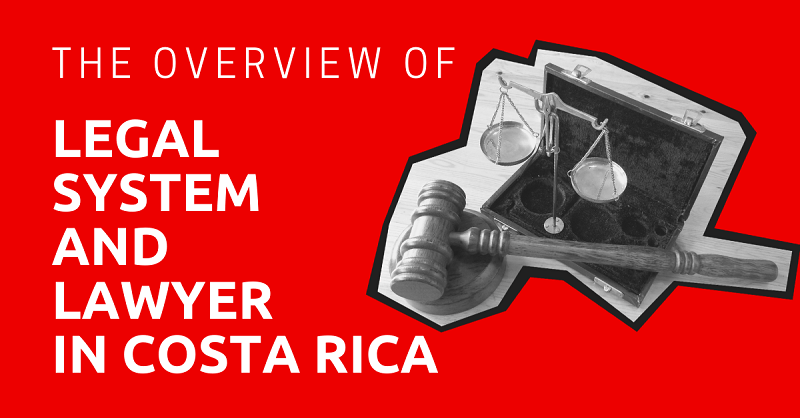
Unless you have spent time looking into it, it’s fair to assume you might not be overly familiar with the legal system in Costa Rica.
Needless to say, being involved in any legal case is rarely simple.
To help you out, this article provides a brief overview of the legal system in Costa Rica, so you will at least be armed with some basic information when you need legal help.
This article will take approximately 20 minutes to read. Don't have the time right now? No worries. You can email the ad-free version of the article to yourself and read it later!
Disclaimer: This article may include links to products or services offered by ExpatDen’s partners, which give us commissions when you click on them. Although this may influence how they appear in the text, we only recommend solutions that we would use in your situation. Read more in our Advertising Disclosure.
Contents
- Key Takeaways
- Costa Rican Common Law
- Costa Rican Civil Law
- Civil Code
- Difference Between Common Law and Civil Law
- Making an Appeal in Costa Rican Courts
- Making Bail
- Cybercrime
- Causing Contempt of Court in Costa Rica
- Dealing with Criminal Cases
- Malpractice
- Legal Self-Representation
- Legal Wills and Inheritance
- Notary Public
- Power of Attorney
- Lawyers in Costa Rica
Key Takeaways
- The Costa Rican legal system has many fundamental similarities to those of other countries, so the basics shouldn’t be difficult for you to understand.
- However, there is plenty of bureaucracy to navigate in all kinds of legal issues.
- You’ll benefit from hiring a lawyer for pretty much any legal concern in the country, from visa applications to dealing with court proceedings.
- There are other legal professionals you might need to hire, including notaries public, depending on what you need to do.
Costa Rican Common Law
Costa Rican common law mirrors that of other nations, including Australia, United States, Canada, and England. The origins of common law can, in fact, be traced to old English laws that were built and enforced by old English courts during the medieval period.
Costa Rican Civil Law
Costa Rica follows a civil law system, a legal system practiced throughout Europe and in many other parts of the world. In a civil law system, a nation’s legislators govern the legal system and are therefore the ones who decide the outcome of legal issues.

In the context of the Costa Rican legal system, those who intend to raise a legal dispute in the country should know an important bit of information: it is usually the high-stakes legal cases that courts deem worthy of their time.
So unless you have a major dispute, there is no guarantee that taking it to court will be worth your time and money and that you will get a favorable outcome.
In Costa Rica, a majority of the civil suits are considered petty and therefore deemed unworthy of the court’s time and resources. It is highly recommended to seek alternative methods to resolve minor legal cases to save on attorneys and legal fees.
Civil Code
Civil code refers to laws that get passed down and then divided into different areas of law that become binding. Costa Rica is a perfect example of a nation that has a civil law system.
Civil law codes refer to multiple divisions of law comprising different areas, including:
- Commercial law
- Succession law
- Obligation law
- Property law
- Private law
Because of the many problems in the legal system in Costa Rica, written law has become a lot stronger on a federal level.
A few countries in Europe have also made changes because of many issues, such as the continued rise of crimes.
Unlike nations that practice common law, legal decisions made under the Costa Rican legal system are not always deemed binding by all courts. The Supreme Court of Costa Rica is the only court that can allow exceptions to laws.
Every decision that the Supreme Court makes has to be followed and adhered to by all other Costa Rican courts.
Difference Between Common Law and Civil Law
Simply put, the civil law system is made up of written codes, while common law refers to decisions based on past cases that were used to settle all issues, as opposed to using codes. This is known as precedent, which comes from case law, as opposed to statues used in civil law. Today, a majority of nations combine both these legal systems.
Normally, they refer to written codes and then use or refer to cases as a guide to decide the outcome of a criminal case.
Making an Appeal in Costa Rican Courts
Previously known as the Courts of Penal Annulment, the Costa Rican Court of Appeals was created to improve the appeals process of the country’s legal system. This new process is also applicable to the appeal of cases against juvenile defendants.
According to the Costa Rican judicial branch, the new process for appeals will follow the same application process as the American Convention on Human Rights. As a signatory of this convention, Costa Rica recognizes the right to appeal criminal convictions, which is passed on to another court for consideration.
The courts of appeal can be found within Santa Cruz, San Jose, San Ramon, and Cartago.
According to the Costa Rican Supreme Court, the new appeals courts and the processes used involve taking all evidence into consideration, conducting a thorough examination of the trial proceedings, and being given a verdict.
This new process for appeals is aimed to help ensure that all citizens have equal rights when convicted of a crime.
Making Bail
After the accused is arrested and detained, they may request to pay bail for their release. Everyone who gets accused, including foreigners, can request bail. Because of a detention, it will be best to make the request through an attorney who can also find out the bail amount that the judge imposes.
Cybercrime
Ley 9048 was passed to fight cybercrime and to widen people’s understanding of what constitutes cybercrime in Costa Rica. The law includes many guidelines that deal with hacking, and follows the United Nations Convention on Cybercrime treaty ratified in 2004.
Nevertheless, many were worried that Ley 9048 would impede on citizens’ right to free speech.
Fortunately, freedom of speech in the country remains untouched, and citizens can still freely express themselves on the internet. That said, many are of the opinion that Ley 9048 should be revised.
Prior to passing Ley 9048, there were no issues concerning the people’s freedom to express themselves on the internet. In fact, as an Internet Freedom Coalition member, Costa Rica has extended its pledge to uphold freedom of expression.
Costa Rica’s Supreme Court even declared that access to the internet is the right of every Costa Rican citizen. This is why it came as a surprise to many that the country was spending substantial resources to combat cybercrime despite the fact it had not previously dealt with serious cybercrime issues on a national scale.
It is also said that Ley 9048 lends itself to different interpretations, which raises concerns that violators may be convicted in different ways, as well. According to its article 230, a person who commits an impersonation scam could face imprisonment of at least three years and a maximum of six years. This includes scams committed on social network sites, email, or through any other electronic means.
Aside from concerns regarding the type of punishment, many have difficulty understanding the law’s full scope mainly because of the way it is worded.
Causing Contempt of Court in Costa Rica
A defendant who commits contempt of court could face jail time, pay fines, or be made to do both, depending on the severity of the case.
Dealing with Criminal Cases
If you are suspected of being involved in any criminal activity, there’s a chance that you may be treated as guilty. Obviously, this would be bad because you might have to go through plenty of legal processes, which could take as long as one year depending on the nature of the alleged crime.
If your case involves drugs or sex with a minor, then you can expect severe punishment for your crime.
After a defendant is arrested and detained, the prosecutor will investigate the case. Once the investigation is complete, the prosecutor will decide if a case warrants a trial.
The Costa Rica legal system provides a public defender if a defendant is unable to obtain one, which is similar to the process in the United States.
If it is determined that a case should go to trial, a request for trial will be submitted during the oral hearing.

Upon the opening of the trial, the court will schedule the trial’s date and time. They will also subpoena any witness and gather the necessary evidence and documents the trial may require. The manner in which the trial takes place is public and oral.
The accused is free to be present or absent from the trial. The prosecutor will then explain the accusation after reading it. Once the accusation is read, the defense will begin its opening argument and provide any evidence that the prosecutor was not able to present.
Once the evidence is submitted and received, the defense and prosecutor will begin debating and hear any and all petitions. If the accused opts to not be present during the trial, then a statement of fact will need to be presented.
An important difference from many legal systems is that Costa Rica doesn’t use a jury system. Anyone familiar with court practices will appreciate that this can make trials easier or harder, depending on the case. Rather than convincing a jury of your peers, you only need to convince one or three judges. Whether this is better or worse ultimately depends on the case in question.
After the closing of the debate, the presiding judge will enter into a deliberation session to make a final decision. The decision will be made by the sole judge who presides over the entire trial.
Malpractice
Medical malpractice cases are common in Costa Rica. These are often compounded by the many loopholes surrounding medical liability laws that medical practitioners tend to leverage to win a malpractice lawsuit.
A good example is that of medical school graduates who, having recently obtained a medical license, perform surgery for which they do not have the right qualifications. In these types of cases, there are legal loopholes doctors can use to avoid liability.
Legal Self-Representation
In Costa Rica, defendants have the right to represent themselves in a legal case. The only thing one should have is a basic knowledge of court proceedings and other relevant legal procedures. Although self-representation is allowed, it’s still recommended to consult with an attorney first.
Legal Wills and Inheritance
If you want to retire in Costa Rica, understanding legal wills and inheritance is important.
In short, legal wills and inheritance in Costa Rica are governed by the Civil Code, and the laws that apply to citizens also apply to foreigners.
Under Costa Rican laws, it is allowed to expedite inheritance processes as long as a notary public serves as a witness. Moreover, speeding up the process will be allowed if the person receiving the inheritance is above the legal age of consent and all parties have agreed to the terms and conditions of the will and/or inheritance.
Keep in mind that if an inheritance is judicial and it goes to probate, then it may take as long as five years before anything gets settled.
Notary Public
Notary Publics in Costa Rica obtain their license from the National Notary Directorate of Costa Rica. They are authorized to authenticate legal documents and signatures.
If you need to have an official document notarized in Costa Rica, you can usually find one within your neighborhood. If you need a document to be validated when you are outside of Costa Rica, then an apostille should be the one to authenticate your document.
However, your home country mustt be a member of the Apostille Treaty in order for the document to be validated. If you have documents that need to be authenticated by an apostille, you must go to Costa Rica’s Ministry of Foreign Affairs.
If your notarized documents need translation, there are notary publics that can translate for you.
Most of the notary publics in Costa Rica are familiar with authenticating foreign documents for use abroad. So if you need to have a document authenticated, make sure you go to a notary public who can deal with foreign notarization and know enough to refer you to an apostille, when necessary.
Power of Attorney
Setting up a power of attorney (POA) in Costa Rica is pretty similar to how it is done in the United States. One individual is designated as a grantor while another is designated as an agent.
The grantor is responsible for providing the authority to legally make decisions for the agent when they are unable to do so.

A POA can also be granted to a corporation within Costa Rica in order to carry out business decisions when the corporate leadership is unable to.
Any power of attorney executed within Costa Rica is done under the Civil Code. The country has three different POA documents: poder generalisimo, poder especial, and poder general.
Poder Generalísimo
Poder generalísimo is a very broad type of power of attorney allowed under the Civil Code. It is also overseen by regulations under Article 1253 CC.
It is generally understood that when poder generalísimo is granted, you are allowing the grantor to have full control of all activity concerning personal and business matters.
Poder generalísimo tends to vest a limited amount of power and therefore may come with a limited ability to perform certain functions. It is also possible to impose a limit on the duration of a power of attorney.
Poder General
Poder general contains more limits because it is considered a power of attorney merely for administrative purposes. With poder general, the agent’s purpose is to permit administrative affairs that don’t require authority to disperse assets. It is governed by the Civil Code under Article 1255.
Article 1255 states that with a power of attorney, an agent is authorized to engage in a wide range of general transactions, as long as these are followed:
- Acknowledge all agreements and perform the necessary actions to preserve the goods without exploiting them.
- Perform the duties in a judicial manner when doing the work required to sustain the property and delay the statute of limitations connected to any powers that were bestowed.
- Obtain property on a temporary basis for less than a year. If it is limited power for a certain amount of time, then the property contract must be below the term. For real estate to be leased, poder especial or poder generalísimo is required.
Poder Especial
Poder especial is another kind of power of attorney used in Costa Rica. It is granted to an agent to execute parts of a document that are outlined within the POA. The governing Civil Code is Article 1256.
Article 1256 states that a special power of attorney is only granted to an agent when a document indicates specific acts. The agent may not extend authority even though it may be warranted in certain instances.
Poder especial must be itemized so that the agent will know every act that needs to be executed.
In most cases, poder especial is used to allow an agent to buy a vehicle, obtain basic utilities, rent a house, sell certain types of properties, or obtain a permit from the government. Note, however, that poder especial has other uses beyond these.
How a Power of Attorney is Granted
The methods used to grant a power of attorney in Costa Rica involve many bureaucratic functions and may seem different from how it is normally granted elsewhere. For one, registration must be made with both poder general and poder generalísimo for validation purposes. The process also requires notarization by a local notary public.
The document needs to be recorded in the notario protocolo, which the grantor will then sign. The notary then enters the document information into the Costa Rican Registry.
If you are unable to get a notary public to notarize your documents, then a Costa Rican consul should be able to do it instead.
Executing poder especial must also be entered into notario protocolo for acts that require registration. So, if a property is being sold with a special power of attorney, it has to be entered into notario protocolo because registration is required for the sales deed.
Dealing with issues relating to different government agencies do not need to be entered into notario protocolo. In such cases, a special power of attorney would only need a grantor’s signature for validation.
Power of Attorney for Corporate Dealings
For limited liability companies or corporations, there will be situations where a power of attorney will be needed as well as an agent who’s fully capable of dealing with business matters and handling complications.
Through a corporate manager or shareholders, a corporation may grant any of the aforementioned three types of power of attorney to a third party.
A corporate manager can go to a notary public to grant a power of attorney to an outsider. On the other hand, corporate shareholders can hold a meeting of shareholders for the purpose of granting an entity a power of attorney. These all require a presentation called a “power of attorney protocolizacion”.
The necessary registration processes will then be required, depending on the type of power of attorney granted.
Lawyers in Costa Rica
Needless to say, you need to consult an attorney in Costa Rica to get advice regarding legal issues.
You can consult lawyers engaged in different legal practice areas, including finance, trademark, criminal, family law, immigration, investment, and offshore banking law, depending on your needs. The Spanish term for lawyer is “abogado“, FYI.
Here are the most common reasons to hire a lawyer:
- For residency
- Opening a new business
- Buying a home or real estate property
- Having a company incorporated
Fortunately, there are plenty of trustworthy attorneys in Costa Rica. Hourly rates of attorney’s feed will vary, and usually depend on the attorney’s expertise. Fees usually range between $40 and $300 an hour for a law firm in San Jose.
It’s easy to find lawyers in Costa Rica. You can find one by walking around your city, searching online, or through an embassy.
But do some research before hiring one. You want to make sure you are hiring a lawyer that specializes in the type of case you have. You don’t want to hire a corporate law attorney to handle your residency paperwork.
Lawyer License
Anyone who graduates from a law school in Costa Rica must obtain a license to practice law. They must also obtain a minimum of 150 work hours of supervised experience. They will also need to take the ethics exam given by the Costa Rican Bar. After passing the ethics exam, they can apply for the license through the Bar.
Under Costa Rican law, only an attorney licensed within Costa Rica can provide legal advice to clients. Foreigners who wish to practice law in Costa Rica must have their law degree reviewed by the University of Costa Rica to ensure it is equal to a law degree in Costa Rica.
Once a foreign degree is transferred to the Colegio de Abogados, the foreigner may begin to practice law.
How to Choose a Lawyer
To ensure that you have an attorney who is competent enough to complete your request, it is imperative that you analyze the lawyer’s background first so that you don’t run into any issues later.
You may notice that the majority of lawyer websites listing Costa Rica lawyers are based within the U.S. The reason for this is because the owners of the websites are also based in the United States.
Foreigners will always need an attorney to consult regarding property investment, apply for residency, or to start a business. A lawyer’s help will be invaluable to foreigners who may be unfamiliar with the legal requirements for these and other other processes.
Make sure you look for and review not just one but several lawyers so you can get an idea of who can best help you with your needs, preferably one who’s competent, knowledgeable, and honest.
You will also come across many lawyers who have attended law school in the U.S so they will likely speak English as well as some other languages.
No matter what, you need to do your homework before choosing an attorney, whether through an online search or a friend’s referral — you will find that there are many options available. Having many options will allow you to narrow down your choices based on specialty.
You can then contact the lawyer whom you think can best give you the most favorable outcome in your case.
Finding the Right Lawyer
It goes without saying that word of mouth is the best way to find a dependable attorney in Costa Rica, so make sure to reach out to relatives or friends you have made in the country.
Do not feel intimidated by lawyers; you need to feel at ease and be comfortable asking them anything about your case so you can get the best results.
Similarly, ensure there are no language barriers with the lawyer you choose. Whether this is in Spanish, English or another language, you’ll want to ensure you can understand their advice clearly.
In the context of the Costa Rican legal system, those who intend to raise a legal dispute in the country should know an important bit of information: it is usually the high-stakes legal cases that courts deem worthy of their time.
So unless you have a major dispute, there is no guarantee that taking it to court will be worth your time and money and that you will get a favorable outcome.
In Costa Rica, a majority of the civil suits are considered petty and therefore deemed unworthy of the court’s time and resources. It is highly recommended to seek alternative methods to resolve minor legal cases to save on attorneys and legal fees.







